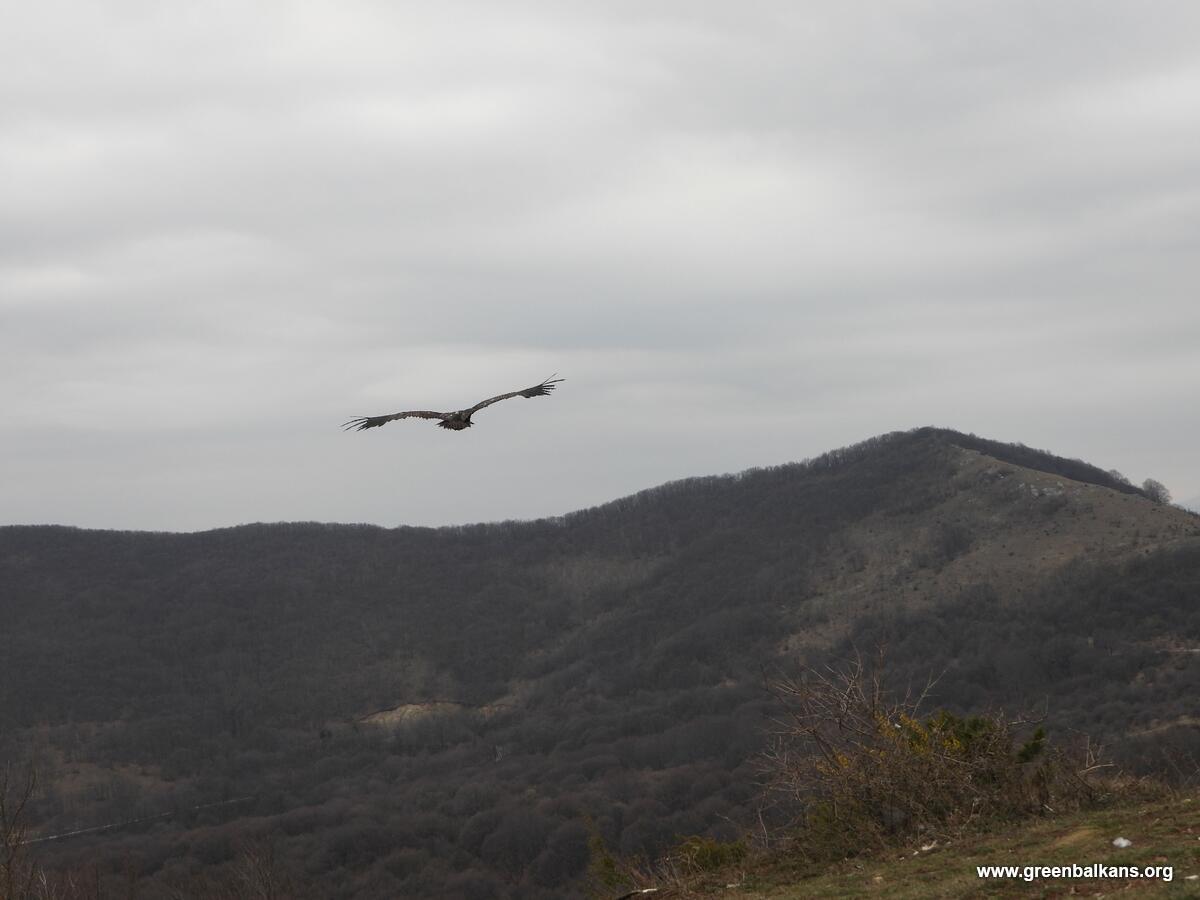
Once again, a serious wildlife crime caused the death of a highly protected and extremely rare bird species – a Cinereous Vulture poisoned in Bulgaria. Animal poisoning is a damaging and non-selective illegal practice that can cause adverse effects on vultures, nature and people.
Cinereous Vulture loses its life from poisoning
On Friday, 17 September, a local man discovered a Cinereous Vulture in a critical state at the Krumovgrad area in Bulgaria. He immediately transported it to a veterinary clinic in the town, but, unfortunately, the vulture did not make it.
Our partners from the Bulgarian Society for the Protection of Birds (BSPB) swiftly responded to the scene once they became aware of the situation. The victim was a young Cinereous Vulture, an extremely rare bird for the country and one that returned as a breeding species in the country this year thanks to long-term reintroduction efforts. The team realised that the Cinereous Vulture had food in its mouth and the flies landing on its beak died immediately – indicating a clear sign that the vulture died from poisoning.
Police investigation launches shortly after

The Regional Inspectorate for Environmental Protection in Haskovo reported the case to the police, who launched an investigation shortly after. Competent actors appointed a veterinary examination, performed an autopsy and collected samples for laboratory analysis to determine the type of poison. The body of the vulture currently remains at the Green Balkans’ Wildlife Rehabilitation and Breeding Centre in Stara Zagora for further research.
The BSPB’s anti-poisoning dog unit, consisting of Nikki the human handler and Bars the dog, thoroughly searched the surrounding area but found no other victims or residues of the poison bait. The police investigation is ongoing. If the poison bait is still in the wild, it will continue to be a deadly threat to animals, especially scavengers, as well as people. It is not yet clear how far the damage from this illegal action extends and whether there are or will be more casualties.
Just one month ago, Bulgaria’s Ministry of Environment and Water approved the country’s National Action Plan to combat the illegal use of poisons in the wild. BSPB developed the plan in close collaboration with the LIFE RE-Vultures and Egyptian Vulture New LIFE projects.
Source: BSPB 
The Vulture Conservation Foundation (VCF) applauds our partners and the police for their swift action in investigating this serious wildlife crime, as well as the local man and veterinarian who tried to save the Cinereous Vulture. We hope the police identifies and prosecutes the criminal(s) responsible to help deter similar instances from happening again!
Cinereous Vultures in Bulgaria

The Cinereous Vulture was found everywhere in Bulgaria during the 19th and the beginning of the 20th century. But due to habitat loss, the widespread use of poisons to combat terrestrial predators, agricultural intensification, lack of food resources, and deliberate shooting of individuals, the species was driven to extinction. The last proven breeding pair nest was recorded in 1993 in the Cold Well area, during an expedition by Green Balkans’ experts. The only natural colony of the species in the Balkans is located in the Dadia National Park, Greece, where often single birds were observed visiting vulture feeding sites in the Eastern Rhodopes, reaching both the Balkan Mountains and the Kresna Gorge. In 2015, the Vultures Back To LIFE project was launched to bring the species back to the country, and in 2021, a reintroduced pair successfully hatched and raised a chick in the wild – the first in nearly three decades!
Fighting vultures’ biggest threat and illegal bird killing
We at the VCF are working alongside multiple partners to minimise illegal bird killing along key migratory flyways. One large-scale project funded by the MAVA Foundation is now underway, with actions in many countries, including communications campaigns, increased enforcement on particular black spots, training of enforcement agencies, and lobbying for strengthening environmental protection legislation and regulations.
Furthermore, we are actively combating illegal wildlife poisoning, vultures’ biggest threat, through raising awareness and building capacities across seven Balkan countries with our newly launched LIFE project, BalkanDetox LIFE, which precisely includes the transfer of Spanish best-practice experience to southeastern Europe. In fact, next week the first Wildlife Crime Academy will take place to provide the necessary skills to competent authorities from the Balkans and Cyprus, enabling them to investigate wildlife crime like poisoning from the early action and CSI to the final procedure at the Court.



